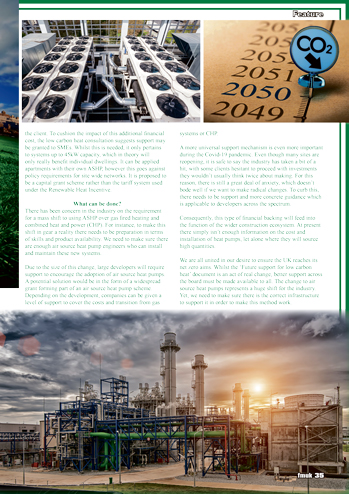Unpicking The ‘Future Support For Low Carbon Heat’ Proposal
 By Ellen Huelin, Head of Sustainability at Whitecode Design Associates
By Ellen Huelin, Head of Sustainability at Whitecode Design Associates
The Department for Business, Energy and Industrial Strategy (BEIS) has released a document for public consultation which explains how support will be given to small-to-medium sized businesses that are moving to low carbon forms of heating. Although the ‘Future support for low carbon heat’ paper is welcomed by the industry, and represents an important episode in the UK’s net-zero carbon evolution, what do these measures mean for larger-scale businesses and developers who also require assistance on what will prove to be quite a radical shift for the industry?
The ‘Future support for low carbon heat’ document brings to the fore several low carbon heating prospects. One of these methods is air source heat pumps, a low-carbon producer of heat which has been widely tried-and-tested across Europe and in more recent years in the UK.
Heat pumps connect to the electric grid, which is gradually being decarbonised through increasing the share of low-carbon energy sources such as wind power and a reduction in the use of fossil fuel burning power stations. Any sceptics should take comfort in the fact heat pumps can perform, generating three to four units of heating for one unit of energy. This is something that can’t be said for electric panel heaters, which only produce a single unit. The consultation document identifies heat pumps as one of the most suitable alternatives to fossil fuels, and makes assessments as to how the industry can make this change to implementing this technology.
What are the concerns?
Achieving zero carbon is an industry-wide aim which is connected to this collective responsibility to reduce the UK’s entire carbon emissions by 2050. The UK’s leading cities are making conscious efforts to move away from gas, in order to reduce emissions and improve air quality for the benefit of humans and the environment. Under the emerging London Plan, the GLA encourage the use of the new carbon emission factor for electricity under SAP10, this essentially means selecting air source heat pumps for these schemes is the most compliant option. However, the current infrastructure is not set up to cater for all new London schemes to use electricity for heating and hot water. Whilst the consultation document’s recommendations make a good start, there are some big questions and uncertainties as to how it will help everybody in the long-term and how feasible some of it is.
Furthermore, there are higher costs associated with the installation of heat pumps when compared to traditional heating systems, so yet again being sustainable will cost the client. To cushion the impact of this additional financial cost, the low carbon heat consultation suggests support may be granted to SMEs. Whilst this is needed, it only pertains to systems up to 45kW capacity, which in theory will only really benefit individual dwellings. It can be applied apartments with their own ASHP, however this goes against policy requirements for site wide networks. It is proposed to be a capital grant scheme rather than the tariff system used under the Renewable Heat Incentive.
What can be done?
There has been concern in the industry on the requirement for a mass shift to using ASHP over gas fired heating and combined heat and power (CHP). For instance, to make this shift in gear a reality there needs to be preparation in terms of skills and product availability. We need to make sure there are enough air source heat pump engineers who can install and maintain these new systems.
Due to the size of this change, large developers will require support to encourage the adoption of air source heat pumps. A potential solution would be in the form of a widespread grant forming part of an air source heat pump scheme. Depending on the development, companies can be given a level of support to cover the costs and transition from gas systems or CHP.
A more universal support mechanism is even more important during the Covid-19 pandemic. Even though many sites are reopening, it is safe to say the industry has taken a bit of a hit, with some clients hesitant to proceed with investments they wouldn’t usually think twice about making. For this reason, there is still a great deal of anxiety, which doesn’t bode well if we want to make radical changes. To curb this, there needs to be support and more concrete guidance which is applicable to developers across the spectrum.
Consequently, this type of financial backing will feed into the function of the wider construction ecosystem. At present there simply isn’t enough information on the cost and installation of heat pumps, let alone where they will source high quantities.
We are all united in our desire to ensure the UK reaches its net zero aims. Whilst the ‘Future support for low carbon heat’ document is an act of real change, better support across the board must be made available to all. The change to air source heat pumps represents a huge shift for the industry. Yet, we need to make sure there is the correct infrastructure to support it in order to make this method work.



























































